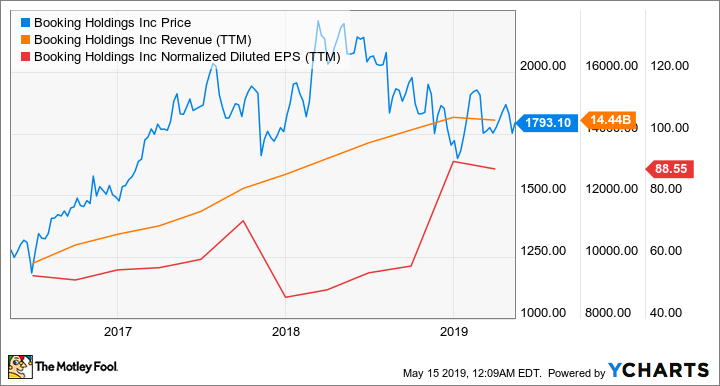Since topping out at all-time highs, shares of Booking Holdings (BKNG -0.51%) have been on a wild ride over the past year, ending nowhere.
It's not as if the company has done poorly. Shares rally on investor optimism and management delivers for the quarter. But management also tempers optimism with soft guidance for the next quarter. The stock falls in response. Then the cycle repeats.
But that wasn't the case this last time around. Results released last week for the first quarter of 2019 were in line with the gloomy outlook given a few months prior. There were multiple factors at play, but the executive team at Booking has been calling for slower growth for quite some time and those predictions finally happened. But investors need not worry too much about the leader in online accommodations.
Data by YCharts.
A strong dollar, competition, and a changing industry
One could pass a lot of blame around for the last quarter's performance. A big reason involved a strong U.S. dollar taking a significant cut out of sales -- and therefore profits -- when Booking converted foreign currency back into its home denomination. Excluding currency exchange rates, gross travel bookings (total value of travel services reserved) and resulting revenues would each have been 6% higher than the actual results (see chart below). But even factoring in currency, it was a big drop off. In the first quarter of 2018, gross travel bookings and revenue increased 21% and 25%, respectively.
|
Metric |
Q1 2019 |
Q1 2018 |
YOY Change |
|---|---|---|---|
|
Gross travel bookings |
$25.4 billion |
$25.0 billion |
2% |
|
Revenue |
$2.84 billion |
$2.93 billion |
(3%) |
|
Earnings per share |
$16.85 |
$12.34 |
37% |
|
Adjusted earnings per share |
$11.17 |
$12.00 |
(7%) |
Data source: Booking Holdings. YOY = year over year.
The upshot is that earnings rose sharply in the quarter due to unrealized investment gains in Chinese travel company Ctrip and food delivery service Meituan. In the recent past, online travel was a fast-growing industry. In many geographies around the globe (like Asia) it still is. However, finding accommodations and other travel services online is not the double-digit growth story it was in developed markets. According to business study group Allied Market Research, the global online travel industry will grow 11% a year through 2022, but that figure is driven primarily by emerging markets in Asia.
Booking isn't going at that fast rate (at least not at the moment), so who is picking up those increased sales? Part of it is that travel accommodation businesses have finally gotten serious about their online presence. In a change from just a few years ago, it's now common for hotel chains, airlines, car rental companies, and other travel providers to not only have a direct booking tool of their own but also a rewards program. That serves the purpose of steering travelers clear of third-party vendors like Booking.com, which get a cut of the final sale.
And then there's other online travel sites, from the small start-ups trying to capitalize on emerging niches within the industry to new forms of accommodation like Airbnb. Internet juggernauts like Alphabet's (GOOGL -0.30%) (GOOG -0.21%) Google have been getting in on the action as well. Google has been steadily increasing its presence in travel cyberspace over the years and recently unified its various travel offerings under the new Google Trips landing page and app. In short, Booking Holdings' massive success over the years keeps drawing attention, and its peers want a piece of the pie.

Image source: Getty Images.
No need to fret, but do adjust expectations
The good news is that the online travel industry is still growing. As the largest online booking site, Booking Holdings will continue to benefit from that long-term trend. However, double-digit growth may increasingly become more of an exception than a rule, as management has been warning investors all along.
That doesn't mean the reason for owning the stock is dead. To stay one step ahead of the competition, Booking Holdings has changed its strategy from simply being online to filling in the gaps to create a cohesive one-stop online shop for travel. That becomes apparent when you look at some of the recent acquisitions, like last year's FareHarbor (an event and attractions booking site) and customer relationship management outfit Venga -- which it added to OpenTable to round out its offering for the restaurant industry.
Nevertheless, it's apparent that competition and a gradual slowdown in the online travel industry is taking a toll on Booking Holdings. Management says there's a plan to deal with that, and growth should be back in the cards next quarter.






